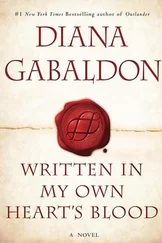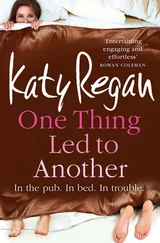He brings up his list of contacts, starts with the A’s, and begins to call every person on it who ever met Lucia. He leaves off his colleagues from the lab who only know of her, but calls everyone whom Lucia might have met and certainly everyone who knew her, however well. That means explaining to each that she’s left him, but he doesn’t care. She’s obviously had some kind of breakdown — her note made no sense to him. He needs to find her and bring her home.
AS MAGGIE SLEEPS IN THE BEDROOM, Lucia sits on the blue denim couch in the living room, scrolling down the seemingly endless list of calls Richard has made in the hours they’ve been gone. It panics her to see how relentless he’s been, but she can’t think about all that now. For the moment, he has no idea where she is. For the moment, she and Maggie are safe. When he calms down, she’ll talk to him, she tells herself. She knows Richard; he wouldn’t be able to hear a word out of her mouth right now. He’d just talk nonstop, making his case that she come home. If she has any chance at all of having him understand why she left, she’ll have to wait.
She turns the light off in the living room but doesn’t move. This is the first quiet moment she’s had all day to consider what she’s done, and the thrill of it all has receded and she’s plainly terrified. Even though she shed her Catholic beliefs somewhere in the middle of college, she finds herself whispering in the dark room, “God help me.” It’s not clear to her to whom she’s pleading, but it is very clear, as she sits in this unfamiliar room with nothing but uncertainty in front of her, that she is going to need a lot of help.
And so she gets up and moves silently to where the help is — to the bedroom, to Maggie. Her daughter will give her the strength she’ll need. Lucia slips into bed beside Maggie, curving her body around the child’s warm limbs, enclosing her smaller body with her own.
“Mommy?”
“Yes, sweetheart, go back to sleep.”
But Maggie doesn’t. She turns around so that she’s looking at her mother, their faces inches apart. And then Maggie takes a small, warm hand and traces the planes and angles of her mother’s face. Lucia closes her eyes and lets her do it. The language of touch. Lucia understands intuitively that Maggie is making sure she’s there, that in the midst of all the upheaval, she is still the same. And she waits while tiny fingers flutter down her jawline and slide across the curve of her full bottom lip, Maggie honing one skill, touch, as she prepares to give up another, speech.
IT IS THE NEXT DAY THAT MAGGIE stops speaking entirely. It isn’t a conscious decision. Maggie does not wake up and tell herself— Today I won’t say a word . She just slips into it.
The day starts with Bernadette knocking on the door early in the morning. Both Lucia and Maggie are still asleep, but Lucia slips quickly out of bed and pads into the living room.
“Off to school, lovey, we’ve got finals to give.” She hands Lucia a wicker basket. “Blueberry muffins for breakfast.”
“Oh, Detta, you don’t have to worry about feeding us, too.”
“Just this morning — there’s not much in the kitchen.”
“I’ll do a shopping.”
“There’s a Vons about five blocks down, turn right on Lincoln. There’s coffee right beside the stove and a French press on the counter.”
Lucia puts a hand on Bernadette’s forearm and says quietly, “You’ve saved my life.”
“You’d better do that yourself,” Bernadette answers, her voice light to take the sting off the imperative.
Lucia brings the basket of muffins back to bed and climbs in beside Maggie.
“Yummm, they smell good, don’t they?”
Maggie holds out her hand and Lucia gives her one and oh, they’re still warm! Mother and daughter lean back against the headboard and eat their muffins in companionable silence. Breakfast in bed, something Lucia would never have let Maggie do at home.
When the muffins are finished, Lucia needs her coffee, so Maggie follows her into the kitchen to watch her grind the beans and pour the boiling water into the French press. And here, too, Maggie doesn’t need to say anything, because Lucia talks the whole time about all the fun things they’ll be able to do now that they’re there and how much better the weather will be and how they’ll wake up each morning and figure out each day.
Then, instead of going grocery shopping, they go to the beach.
THE BEACH IS WINDY AND OVERCAST and Maggie has to wear a sweatshirt over her red bathing suit. But because it’s early in the morning and because it isn’t officially summer yet, they have the sand mostly to themselves.
Lucia takes an old blanket out of the trunk of her car along with a sand bucket, a shovel, and some plastic cups that always come out when they go to the beach, and they make their way to the waterline.
On the blanket, from several feet away, Lucia watches her daughter dig a hole, each shovelful carefully lifted out and the remaining sand patted in place, Maggie humming softly to herself as she works. And then suddenly it’s as if something heavy, something Lucia’s been carrying, slips from her grasp and she is overwhelmed with exhaustion. Now that they’re here, now that they’ve made it to Bernadette’s, she has no idea how to take the next step. Rationally, logically, she knows what to do — find a job, find an apartment, find a school for Maggie for the fall. But how to do all that? She’s never been on her own, not really. Living in the dorms at Oberlin doesn’t count. And then she met Richard and they began living together and the next eight years were spent listening to what he set out for them and agreeing.
“Maggie,” Lucia calls out, “what are you building?”
Maggie looks up at her mother, frowns, shrugs her tiny shoulders, and goes back to her digging.
“Is it a swimming pool or a lake?”
Maggie turns around but doesn’t answer.
“A bowl for spaghetti or a birdbath for the seagulls?”
This time Maggie doesn’t even turn around. And Lucia gets up and walks to where her daughter kneels on the sand, deeply focused on the job in front of her, working carefully, in a rhythm.
Lucia sits beside her child and puts a hand on her small back. “Will you tell me what you’re making?” Maggie shakes her head. “Because …?” Lucia leaves the question open-ended, but Maggie doesn’t bite.
Lucia takes a minute, looks out to the water, allows the waves to lull her into a slower rhythm. Take notice of what’s in front of you , she reminds herself. Watch . She knows her child well enough to know she’s upset. Well, why wouldn’t she be? She needs more of an explanation.
“I love you with all my heart,” she begins again. Maggie doesn’t look at her, simply continues digging and patting. “And I know Daddy does, too. But when Daddy and I live in the same house, that doesn’t make me happy anymore. And I know that you’re happier when we’re all together and that’s what makes all this so much harder.”
She waits to see how Maggie will react to what she’s just said, but there’s no change in her expression or body language.
Lucia sighs, thinks of what to say next, and then, “You must have some questions. You can ask me and I will tell you as much as I know.” There’s silence. “Maggie?” And her daughter looks up, her dark eyes clear and present, but that’s all. No question follows and Lucia is getting annoyed.
“Maggie, I know you must have at least one question.”
The child goes back to her digging.
“Oh, so today you’re not talking. Is this a game?”
Maggie shakes her head, a tiny shake without looking at her mother.
Lucia backs off. Okay, she won’t push. If this is what Maggie needs to process all the changes that she has thrust upon her, well then, Lucia can wait.
Читать дальше












